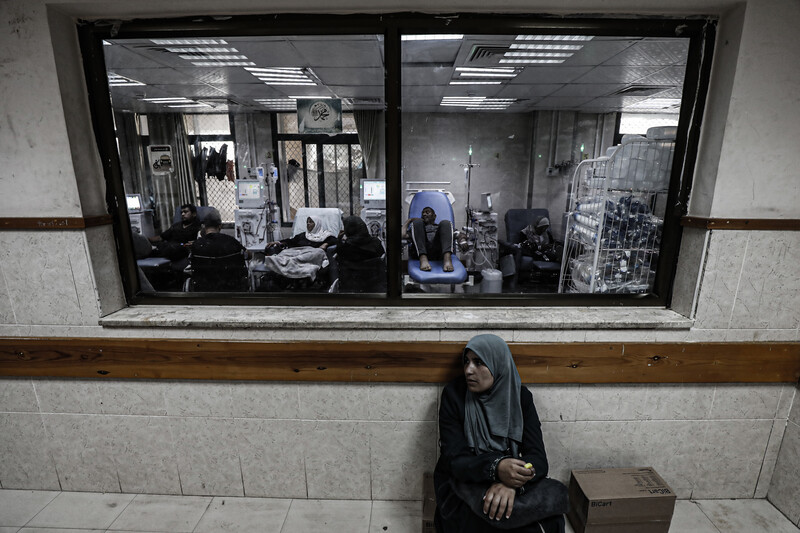The Electronic Intifada 5 June 2024

A woman waits for relatives receiving treatment at al-Aqsa hospital in Deir al-Balah on 13 May 2024.
APA imagesSince the beginning of the conflict, I have volunteered to use my medical training to help my people. I was angry about everything that was happening.
From the beginning, in October, the situation at al-Shifa hospital – now entirely in ruins – was catastrophic. There weren’t enough beds for the wounded, who were scattered everywhere. No one seemed to know what was happening as dead bodies piled up.
If you wanted to learn about someone’s condition, you had to go to what was called the “martyrs’ tent” in the hospital courtyard, which was overflowing with bodies.
Seeing fathers bid farewell to their sons, and mothers collapsing from the difficulty of the situation jarred the mind. These were unforgettable, harrowing scenes.
At the end of November, over a month after Israel had decided to cut food, water, fuel and electricity to all of Gaza, those of us working at the hospital were so deprived of water, some of us drank the liquids in the storage room.
Hospital officials had pleaded with the Israeli military to allow patients to evacuate. Once they did, the electricity was cut off, leaving medical staff trapped for two days and surrounded by the enemy, awaiting death.
One time, we gathered in a dark reception room. The only thing I could think of was my mother, a reel of my life with her spun past in my mind.
The human silence was total. The only sounds were gunfire, tanks, and shelling. We were waiting for anything to happen. And then a doctor started singing a song about life and its beauty. His voice was also beautiful. I just wanted to sleep at that moment.
We eventually evacuated the hospital, taken away in ambulances. Before we cleared the area, we were searched by Israeli soldiers, and some senior doctors were detained.
New place, same horror
When I reached the south, I felt somewhat safe again, because I was among my people despite the constant shelling.
I went to work immediately at Nasser hospitall in Khan Yunis. It was a different place, but the same horror.
A woman was lying on the floor with her abdomen open. I saw her intestines and liver. A doctor was trying to resuscitate her. Next to her was a fetus.
The scene: Blood and screaming, blood and screaming.
The doctor stopped his efforts and announced the deaths of the mother and her child. Together.
I froze, trying to comprehend what had happened.
How can a child who hasn’t seen life yet die next to his mother like this?
How can a mother die without seeing her baby?
Many children have been wronged in this war.
“More than 200 days of war have taken an unimaginable toll on children,” UNICEF director Catherine Russell said in April, when more than 14,000 children had been reported killed.
The baby was just one more in that horrific number.
All we can say, all we can hope for, is that he and his mother are in heaven together.
Evacuated again
Eventually, the Israeli military also reached Nasser hospital.
In early April, we were evacuated again, and I went to work at al-Aqsa hospital in Deir al-Balah.
There, a 10-year-old girl called Jinan came to me at work. I think perhaps she chose me because I’m a woman, and from her perspective, telling her problem to a girl like her was easier than telling it to another doctor.
She was wearing a hijab, which surprised me because of her young age. She told me that she had lice in her head and had been having trouble sleeping.
I told her to take off the hijab so that I could see what was bothering her, but she refused and told me it was just lice. I said for me to write her a prescription, I needed to see what was wrong.
Sensing she was embarrassed, I told her to come with me to the side.
I could barely conceal my shock when she took off her hijab. An entire lice colony seemed to be growing on her head. It wasn’t hair anymore. Her hair was so stiff that it stuck to her ears, and when she tried to pull it, her ear became inflamed from the amount of grime and hair sticking to it.
How could this girl cope like this? Now I understood the hijab and the embarrassment.
I told the girl to bathe with lice-and-insect shampoo and to take extra care of her hair. She told me there was no water where she was staying and no money to buy shampoo.
I really wanted to help her, so I told her to get a special cream for her ears and wrote the name of the cream on a form so she could get it free from the hospital pharmacy. There was no lice shampoo in the hospital.
I saw her the next day getting her head shaved in the hospital courtyard. There was a barber there working cheaply with basic tools.
Poor girl.
I stood aside watching her being shaved. I didn’t want the girl to see me. Still, she saw me looking, and when her eyes met mine, I truly saw in them sorrow and tears.
I didn’t want to interfere and embarrass her more, so I went back to my work.
Shrooq Hijazi is a volunteer doctor in Gaza.





